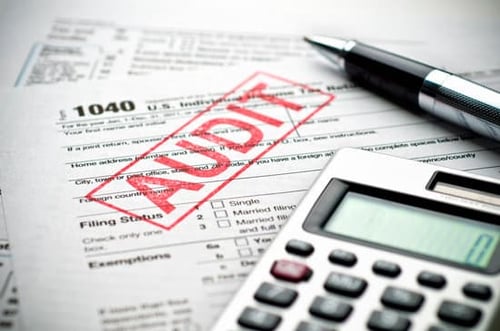Powell Tax Law Blog

Prepping for Tax Season: 7 Stress-Free Tips
Ready or not, tax season is upon us once again, and being prepared is key to navigating it smoothly.
“Preparation not only reduces stress but can also result in potential tax savings,” says experienced tax lawyer Steve Powell.
While thoughts of filing taxes and dealing with the Internal Revenue Service are sure to raise the average taxpayer’s blood pressure, try these stress-free tips to prep for tax season:
Tax Prep Tip No. 1: Gathering Necessary Documents
Tax preparation begins with gathering the necessary documents to accurately report your financial activities throughout the year.
Collecting necessary tax documents throughout the year will make April 15 each year a much more relaxed day.
Here are some key documents to gather:
- W-2 forms from employers: These forms detail your earnings and withholdings from your job(s) throughout the year.
- 1099 forms for freelance/contract work: If you've worked as an independent contractor or freelancer, you'll receive 1099 forms documenting your income.
- Receipts for deductible expenses: Keep track of receipts for business expenses, charitable donations, and medical expenses, as these may be deductible.
- Investment statements: Statements such as 1099-INT and 1099-DIV provide information about interest and dividend income from investments.
- Mortgage interest statements: Documentation of mortgage interest paid can be deductible.
- Retirement account contributions and distributions: Keep records of contributions made to retirement accounts and any distributions received.
- Bank Statements: Keep records of your bank statements, including checking, savings, and investment accounts. These statements can help verify income, track expenses, and reconcile any discrepancies.
- Credit Card Statements: Retain credit card statements to track deductible expenses, such as business-related purchases, charitable donations, and medical expenses. These statements can serve as supporting documentation for itemized deductions.
- Receipts for Home Improvements: If you've made improvements to your home, such as renovations or energy-efficient upgrades, keep receipts and documentation of these expenses. Certain home improvements may qualify for tax credits or deductions.
- Education Expenses: Maintain records of tuition payments, student loan interest statements, and receipts for educational expenses. These expenses may be eligible for education tax credits or deductions.
- Health Insurance Information: Keep records of health insurance premiums paid, as well as documentation of any health care expenses, including doctor visits, prescriptions, and medical procedures. Some medical expenses may be deductible if they exceed a certain threshold.
- Childcare Expenses: If you pay for childcare or dependent care services, keep records of these expenses, including receipts and statements from childcare providers. Childcare expenses may be eligible for tax credits or deductions.
- Home Office Expenses: If you work from home, maintain records of home office expenses, such as utilities, internet, and office supplies. These expenses may be deductible if you use a portion of your home exclusively for business purposes.
- Vehicle Expenses: If you use your vehicle for business purposes, keep records of mileage, fuel costs, and maintenance expenses. These expenses may be deductible if you use your vehicle for business-related travel.
Tax Prep Tip No. 2: Understanding Tax Deductions and Credits
Navigating the landscape of tax deductions and credits requires a keen understanding of the tax code and awareness of available opportunities to reduce your tax liability.
Deductions serve as valuable tools for lowering your taxable income and familiarizing yourself with common deductions can lead to significant savings.
Similarly, tax credits offer a dollar-for-dollar reduction in your tax bill and can sometimes result in a refund if they exceed your tax liability.
By understanding the eligibility requirements and documentation needed for deductions and credits, you can maximize your tax savings and keep more money in your pocket.
- Common deductions:
- Mortgage interest: Mortgage interest paid on a primary or secondary residence may be deductible, subject to certain limitations (for 2023 you can deduct home mortgage interest on the first $750,000 ($375,000 if married filing jointly) of indebtedness, with higher limitations if you are deducting mortgage interest from indebtedness incurred before Dec. 16, 2017.). To claim this deduction, you'll need to have a Form 1098 from your mortgage lender, which outlines the amount of interest paid during the tax year.
- State and local taxes: You may be able to deduct state and local income taxes or state and local sales taxes paid during the tax year, depending on which option provides the greater benefit. To claim this deduction, you'll need records of your state and local tax payments, such as W-2 forms or receipts for estimated tax payments. For 2023, the deduction of state and local income, general sales, and property taxes is limited to a combined total deduction of $10,000.
- Charitable contributions: Charitable contributions made to qualified organizations may be deductible, provided you itemize your deductions. Keep records of cash contributions, as well as documentation of non-cash donations, such as clothing, household items, or vehicles. A receipt or acknowledgment from the charity is typically required for contributions of $250 or more.
- Mortgage interest: Mortgage interest paid on a primary or secondary residence may be deductible, subject to certain limitations (for 2023 you can deduct home mortgage interest on the first $750,000 ($375,000 if married filing jointly) of indebtedness, with higher limitations if you are deducting mortgage interest from indebtedness incurred before Dec. 16, 2017.). To claim this deduction, you'll need to have a Form 1098 from your mortgage lender, which outlines the amount of interest paid during the tax year.
- Tax credits:
- Child tax credit: For the 2023 tax year, the Child Tax Credit provides a tax credit of up to $2,000 per qualifying child under the age of 17. To qualify, the child must meet certain criteria, including being a dependent, having a valid Social Security number, and living with you for at least half the year. The credit begins to phase out for higher-income taxpayers.
- Earned income tax credit (EITC): The Earned Income Tax Credit is a refundable tax credit for low-to-moderate-income individuals and families. The amount of the credit depends on your earned income, filing status, and number of qualifying children. Eligibility requirements and the amount of the credit can vary from year to year.
- Education credits: There are two main education credits available: the American Opportunity Tax Credit (AOTC) and the Lifetime Learning Credit (LLC). The AOTC provides a credit of up to $2,500 per eligible student for qualified education expenses incurred during the first four years of post-secondary education. The LLC provides a credit of up to $2,000 per tax return for qualified education expenses incurred throughout the taxpayer's lifetime. Keep records of tuition payments, enrollment status, and other education-related expenses to claim these credits.
- Child tax credit: For the 2023 tax year, the Child Tax Credit provides a tax credit of up to $2,000 per qualifying child under the age of 17. To qualify, the child must meet certain criteria, including being a dependent, having a valid Social Security number, and living with you for at least half the year. The credit begins to phase out for higher-income taxpayers.
Tax Prep Tip No. 3: Organizing Financial Records
Organizing your financial records is not just a matter of convenience; it's a critical step in ensuring accurate and efficient tax preparation. With the multitude of documents and receipts accumulated throughout the year, establishing a system for organization is paramount.
Regardless of the method you choose, maintaining accurate and organized records ensures that you have the information you need at your fingertips when it's time to prepare your taxes.
Keep these three components in mind:
- Keeping accurate and organized records is essential for efficient tax preparation.
- Utilize software or create a filing system to keep track of documents and receipts.
- Maintain backup copies of important records to safeguard against loss or damage.
Tax Prep Tip No. 4: Tax Planning Strategies
Tax planning isn't just about preparing your taxes at the end of the year; it's about strategically managing your finances throughout the year to minimize your tax liability:
- Consider contributing to retirement accounts like a 401(k) or IRA to potentially lower taxable income.
- Explore options for deferring or accelerating income and expenses based on your financial situation.
- Implement charitable giving strategies to maximize deductions.
- Utilize tax-loss harvesting to offset gains from investments.
Implementing these tax planning strategies throughout the year can help you minimize taxes and keep more of your hard-earned money.
Tax Prep Tip No. 5: Filing Options
As April 15 fast approaches, it's important to consider your options for filing your taxes:
- Decide whether to hire a tax professional or prepare your taxes yourself.
- Explore various tax software options for self-preparation.
- Be aware of filing deadlines and extension requests if more time is needed.
Tax Prep Tip No. 6: Common Tax Mistakes to Avoid
As you prepare to file your taxes, it's important to be mindful of common pitfalls that can lead to errors or omissions on your tax return:
- Watch out for mathematical errors when completing tax forms.
- Take care not to overlook potential deductions and credits.
- Report all income accurately to avoid penalties.
- Be mindful of filing deadlines and consider requesting extensions if necessary.
Tax Prep Tip No. 7: Seeking Professional Assistance
While many taxpayers choose to prepare their taxes themselves, there are situations where seeking professional assistance may be beneficial.
“If your financial situation is complex or you're unsure about certain tax rules and regulations, hiring a tax professional can provide peace of mind and ensure compliance with tax laws,” advises Powell.
Three tips on seeking advice:
- Know when it's appropriate to seek help from a tax professional.
- Look for qualifications and credentials when choosing a tax professional.
- Communication and transparency are key when working with a tax advisor.
By choosing the right tax professional and maintaining open lines of communication, you can navigate tax season with confidence and ease.
There’s no doubt that tax season can be a daunting and stressful time for many individuals and businesses, but with proper preparation and guidance, it doesn't have to be. Follow the tips above to streamline your tax prep, while maximizing deductions and credits, and minimizing the potential for mistakes and oversights.
While self-preparation may be suitable for some, seeking professional assistance from experienced tax professionals can provide invaluable peace of mind, particularly for those with complex financial situations or uncertainties about tax laws and regulations.
At Powell Tax Law, our team of knowledgeable tax attorneys and professionals is dedicated to helping clients in Houston, Austin, San Antonio, and beyond navigate the complexities of tax season with confidence and ease.
Schedule a consultation today for help in achieving tax efficiency and maximizing your financial success.







